高考英语句子成分讲解课件(63张PPT)
文档属性
| 名称 | 高考英语句子成分讲解课件(63张PPT) |

|
|
| 格式 | zip | ||
| 文件大小 | 319.2KB | ||
| 资源类型 | 教案 | ||
| 版本资源 | 通用版 | ||
| 科目 | 英语 | ||
| 更新时间 | 2020-07-27 00:00:00 | ||
图片预览

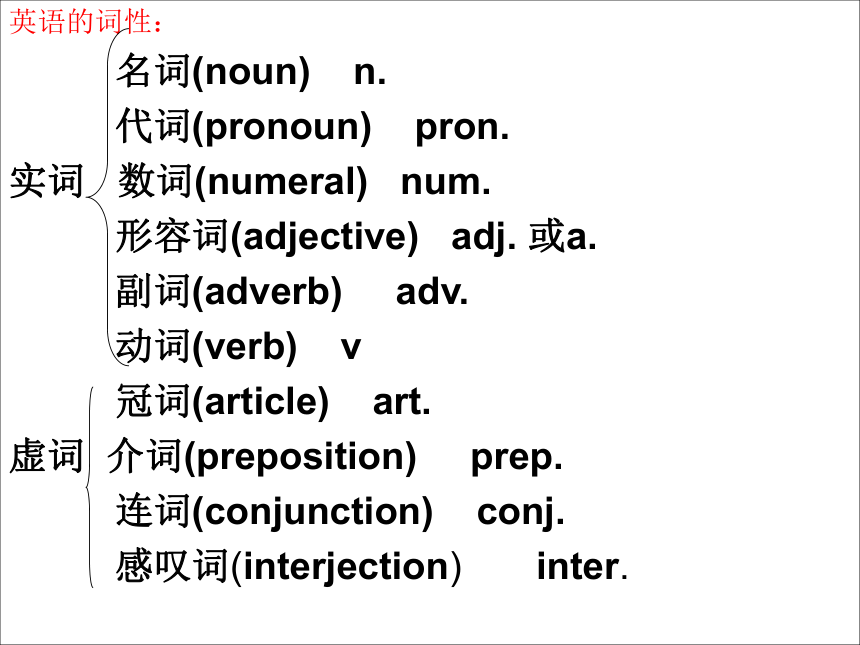
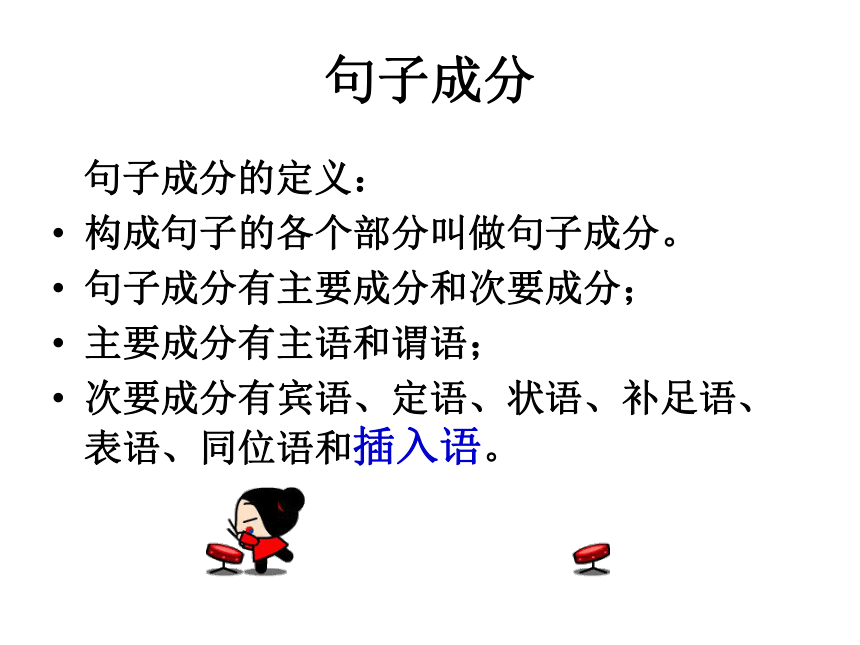
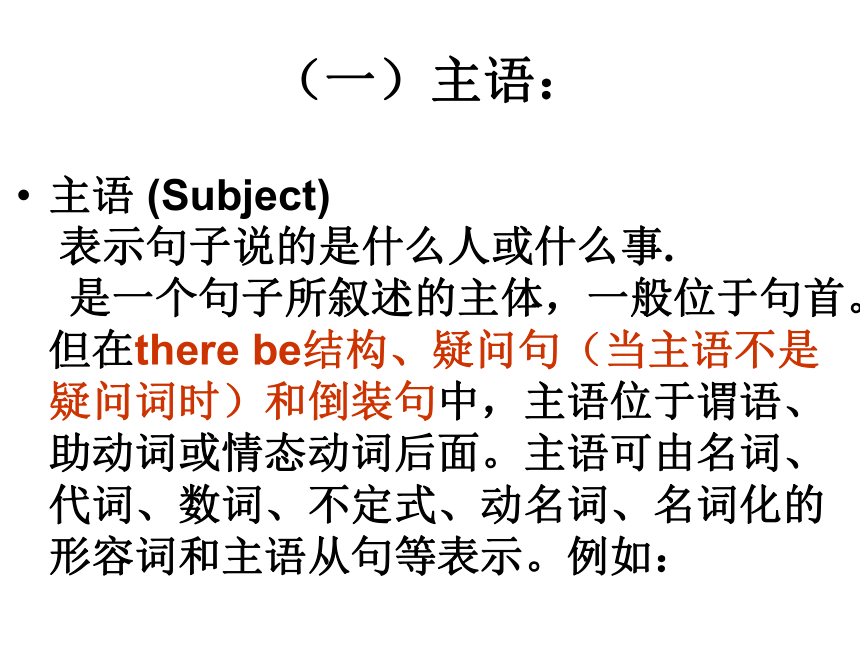
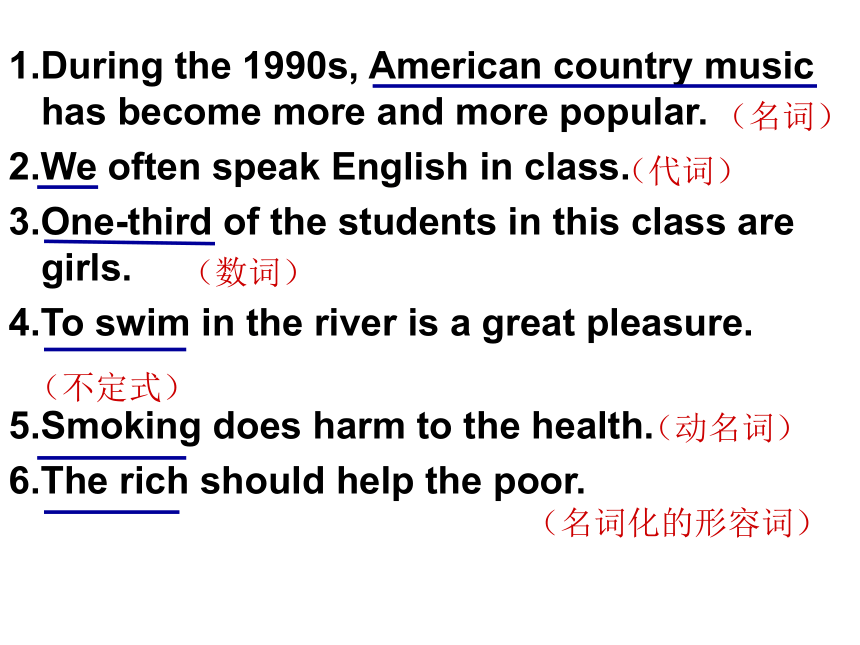
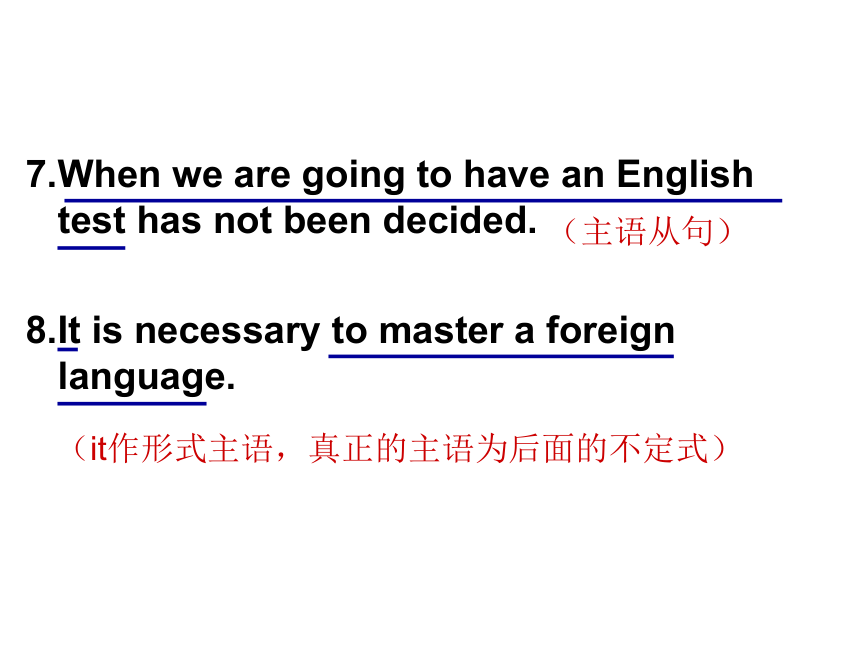
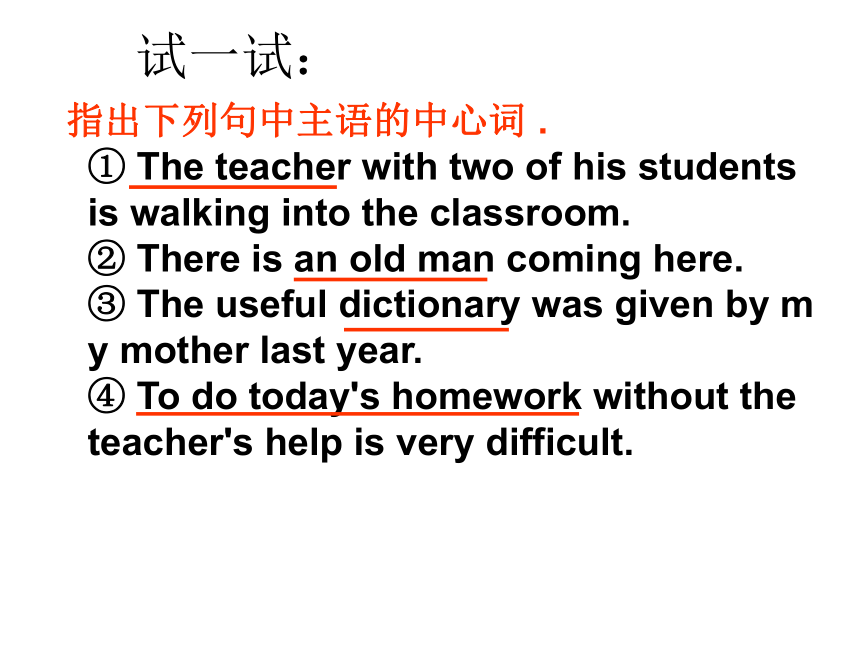
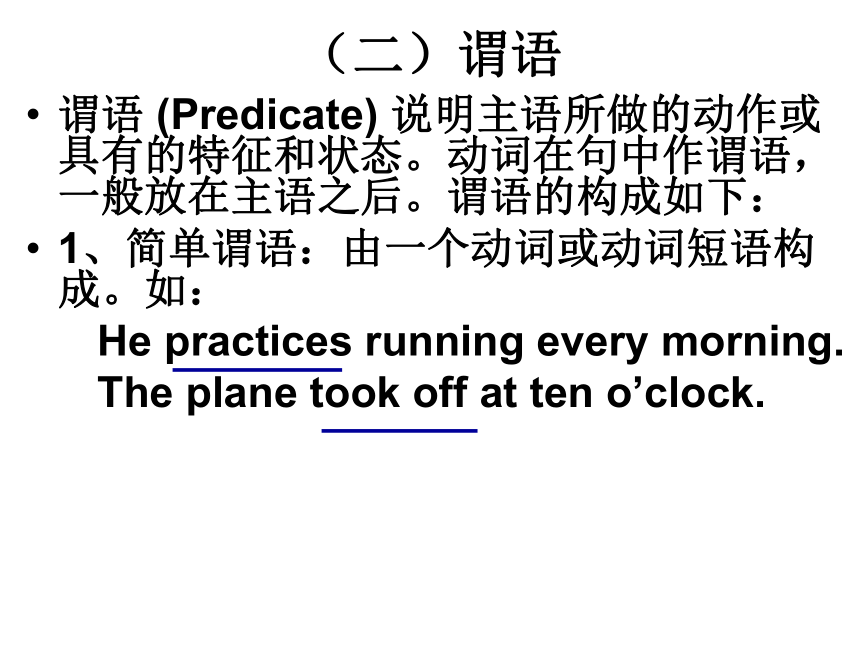

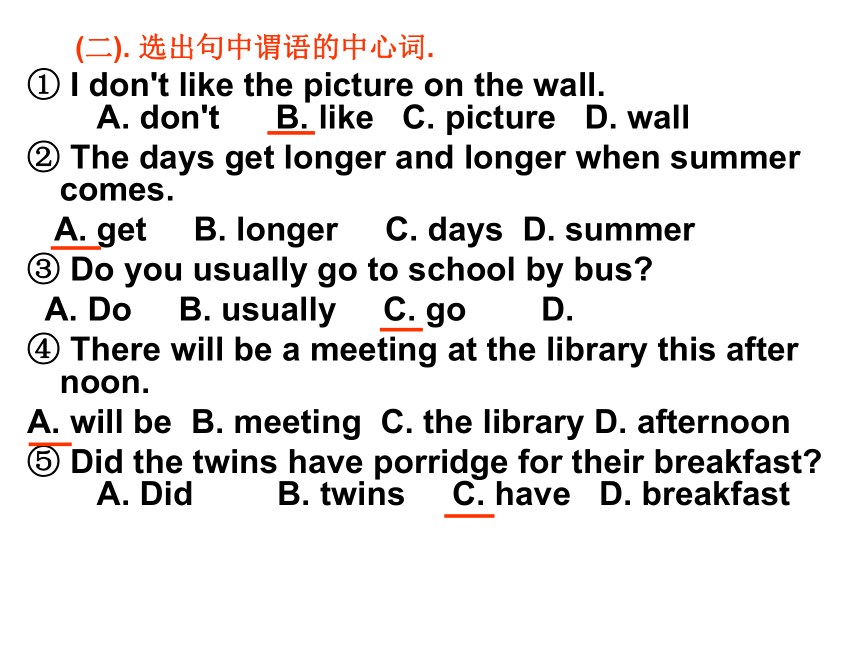
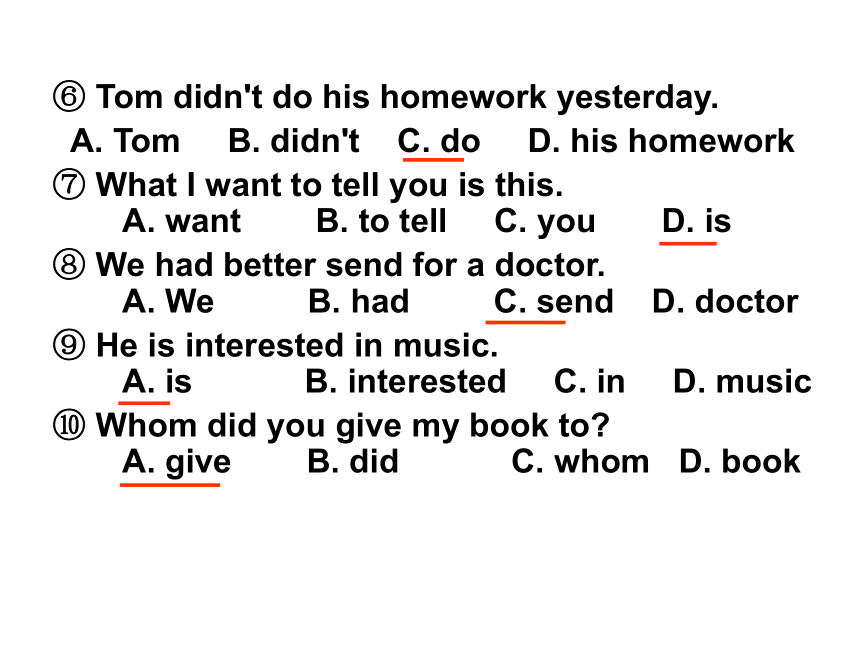
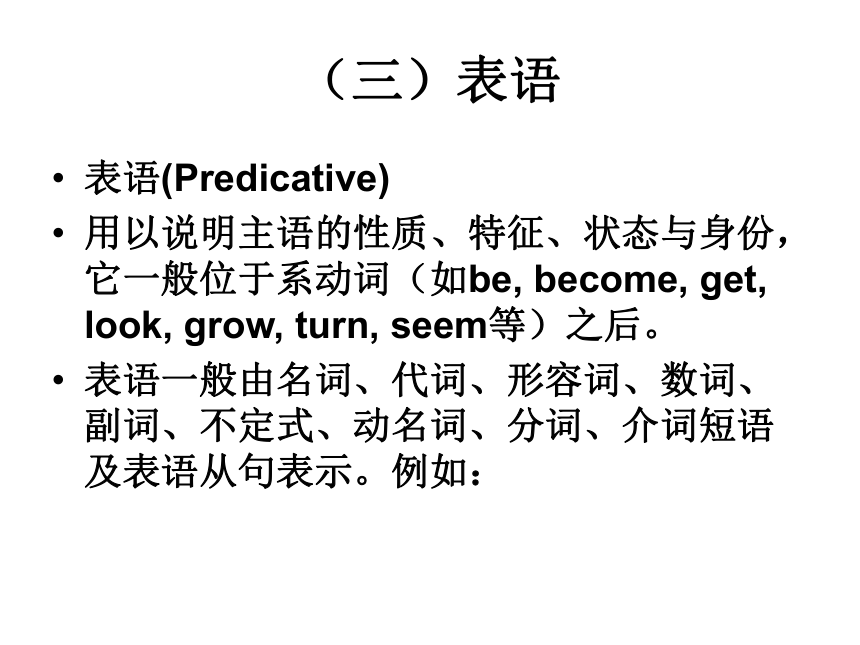
文档简介
课件63张PPT。
句子成分及练习
英语的词性:
名词(noun) n.
代词(pronoun) pron.
实词 数词(numeral) num.
形容词(adjective) adj. 或a.
副词(adverb) adv.
动词(verb) v
冠词(article) art.
虚词 介词(preposition) prep.
连词(conjunction) conj.
感叹词(interjection) inter.
句子成分 句子成分的定义:
构成句子的各个部分叫做句子成分。
句子成分有主要成分和次要成分;
主要成分有主语和谓语;
次要成分有宾语、定语、状语、补足语、表语、同位语和插入语。(一)主语:主语 (Subject)
表示句子说的是什么人或什么事.
是一个句子所叙述的主体,一般位于句首。但在there be结构、疑问句(当主语不是疑问词时)和倒装句中,主语位于谓语、助动词或情态动词后面。主语可由名词、代词、数词、不定式、动名词、名词化的形容词和主语从句等表示。例如:1.During the 1990s, American country music has become more and more popular.
2.We often speak English in class.
3.One-third of the students in this class are girls.
4.To swim in the river is a great pleasure.
5.Smoking does harm to the health.
6.The rich should help the poor. (名词)(代词)(数词)
(不定式)(动名词)(名词化的形容词)
7.When we are going to have an English test has not been decided.
8.It is necessary to master a foreign language.
(主语从句)(it作形式主语,真正的主语为后面的不定式)试一试:?指出下列句中主语的中心词?. ①?The?teacher?with?two?of?his?students? is?walking?into?the?classroom. ②?There?is?an?old?man?coming?here. ③?The?useful?dictionary?was?given?by?my?mother?last?year. ④?To?do?today's?homework?without?the? teacher's?help?is?very?difficult. (二)谓语 谓语 (Predicate) 说明主语所做的动作或具有的特征和状态。动词在句中作谓语,一般放在主语之后。谓语的构成如下:
1、简单谓语:由一个动词或动词短语构成。如:
He practices running every morning.
The plane took off at ten o’clock.
(二)谓语 2、复合谓语:
(1)由情态动词加动词原形构成。如:
You may keep the book for two weeks.
(2)由助动词加动词原形,现在分词,过去分词构成。如:
Do you speak English?
They are working in a field.
He has caught a bad cold.
(3)由系动词加表语构成。如:
We are students.
注意:谓语与主语在人称与数方面要保持一致。 (二).?选出句中谓语的中心词.?
①?I?don't?like?the?picture?on?the?wall. ????A.?don't??????B.?like???C.?picture???D.?wall
②?The?days?get?longer?and?longer?when?summer?comes.
A.?get?????B.?longer?????C.?days??D.?summer
③?Do?you?usually?go?to?school?by?bus?
A.?Do???? B.?usually?? C.?go????? D.?
④?There?will?be?a?meeting?at?the?library?this?afternoon.
A.?will?be??B.?meeting??C.?the?library?D.?afternoon
⑤?Did?the?twins?have?porridge?for?their?breakfast? ????A.?Did?????????B.?twins?????C.?have???D.?breakfast⑥?Tom?didn't?do?his?homework?yesterday.
A.?Tom?????B.?didn't????C.?do?????D.?his?homework
⑦?What?I?want?to?tell?you?is?this. ????A.?want????????B.?to?tell?????C.?you???????D.?is
⑧?We?had?better?send?for?a?doctor. ????A.?We??????????B.?had?????????C.?send????D.?doctor
⑨?He?is?interested?in?music. ????A.?is????????????B.?interested?????C.?in?????D.?music
⑩?Whom?did?you?give?my?book?to? ????A.?give????????B.?did????????????C.?whom???D.?book (三)表语 表语(Predicative)
用以说明主语的性质、特征、状态与身份,它一般位于系动词(如be, become, get, look, grow, turn, seem等)之后。
表语一般由名词、代词、形容词、数词、 副词、不定式、动名词、分词、介词短语及表语从句表示。例如: 1.Our teacher of English is an American.
(名词)
2.Is it yours?
(代词)
3.The weather has turned cold.
(形容词)
4.The speech is exciting.
(分词)
5.Three times seven is twenty one?
(数词)6.His job is to teach English.
(不定式)
7.His hobby is playing football.
(动名词)
8.The meeting is of great importance.
(介词短语)
9.Time is up. The class is over.
(副词)
10.The truth is that he has never been abroad.
(表语从句)注意:系动词(Linking verb)用于连接主语和表语,说明主语的状态,性质,特征和身份等。1)状态系动词用来表示主语状态,只有be一词,例如:
He is a teacher.
2)持续系动词用来表示主语继续或保持一种状况或态度,主要有keep, remain, stay, lie, stand, 例如: He always kept silent at meeting.?
3)表像系动词用来表示“看起来像”这一概念,主要有seem, appear, look, 例如: He seems (to be) very sad.??注意:系动词(Linking verb)用于连接主语和表语,说明主语的状态,性质,特征和身份等。?
4)感官系动词主要有feel, smell, sound, taste, 例如: This kind of cloth feels very soft.
5)变化系动词表示主语变成什么样,主要有become, grow, turn, fall, get, go, come, run.例如: The river was beginning to run dry. ??
6)终止系动词表示主语已终止动作,主要有prove, turn out, 表达“结果是;证明是 ”,之意,例如: The rumor(谣言) proved false.
His plan turned out a success.?? 挑出下列句中的表语
-- The old man was feeling very tired.
-- The leaves have turned yellow.
-- Soon They all became interested in the subject.
-- My dream is that I can be admitted into a key university.一个完整的句子做表语, 那么这个句子叫表语从句。(四)宾语 宾语(Object)表示动作的对象或承受者,一般位于及物动词和介词后面。例如:
1.He is doing his homework.
2.The heavy rain prevented me from coming to school on time.
3.How many dictionaries do you have? I have five.(名词)(代词、动名词)(名词、数词)4.They helped the old with their housework yesterday.
5.He pretended not to see me.
6.I enjoy listening to popular music.
7.I think(that)he is fit for his office.
(名词化形容词,名词)(不定式短语)
(动名词短语)
(宾语从句)宾语种类:
(1)双宾语(间接宾语+直接宾语),例如:Lend me your dictionary, please.
To: write, tell, pass, give, send, promise, show, hand, read, tell, bring, throw等,例如:
He sent the novel to William yesterday.
For: leave, buy, build, choose, cook, draw, find, get, order, post, save等,例如:
She bought a gift for her mother.
(2)复合宾语(宾语+宾补),例如:
They elected him their monitor.?划出句中的直接宾语和间接宾语?
①?Please?tell?us?a?story.
②?My?father?bought?a?new?bike?for?me?
last?week.
③?Mr.?Li?is?going?to?teach?us?history?next?term.
④?Here?is?a?pen.?Give?it?to?Tom.
⑤?Did?he?leave?any?message?for?me?? ?直宾指物
间宾指人
下列动词只能接不定式做宾语
ask, agree, care, choose, demand, dare, decide, expect, fail, help, hope, learn, manage, offer, plan, prepare, pretend, promise, refuse, want, wish, desire等,如:
He refused to lend me his bike.下列动词只能接动名词做宾语
admit, avoid, advise, consider, enjoy, excuse, escape, finish, imagine, mind, practise, suggest等,如:
John has admitted breaking the window .下列动词既可接不定式,也可接动名词做宾语,但意义不同,如mean, try, remember, forget, regret等。
forget to do表示“未发生的动作”,forget doing表示“已完成的动作”。如:
Don't forget to come here earlier tomorrow.(还没来)
I forgot returning the book to him.
(书已还给他了)
挑出下列句中的宾语
① My brother hasn't done his homework.
② People all over the world speak English.
④ How many new words did you learn last class?
⑤ The old man sitting at the gate said that he was ill.一个完整的句子做宾语, 那么这个句子叫宾语从句。(五)宾语补足语 宾语补足语(Object Complement),用于补充说明宾语的动作,一般位于宾语之后,宾语与宾语补足语一起构成复合宾语。可以接复合宾语的动词有:tell,let,help,teach, ask,see,have,order,make等。“宾补”一般可由名词、形容词、副词、不定式、分词、介词短语和从句充当。例如:1.His father named him Xiaoming.
2.They painted their boat white.
3.Let the fresh air in.
4.You mustn’t force him to lend his money to you.
5.We saw her entering the room.
6.We found everything in the lab in good order.
7.We will soon make our city what your city is now.(名词)(形容词)(副词)(不定式短语)(现在分词)(介词短语)(从句)挑出下列句中的宾语补足语
① He asked her to take the boy out of school.
② She found it difficult to do the work.
③ They call me Lily sometimes.
④ I saw Mr. Wang get on the bus.(六)定语 修饰名词或代词的词、短语或从句称为定语(Attribute)。
定语可由以下等成分表示:
1.Guilin is a beautiful city.(形容词)
2.China is a developing country; America is a developed country.(分词)
3.There are thirty women teachers in our school.(名词)
4.His rapid progress in English made us surprised.(代词)5.Our monitor is always the first person to enter the classroom.
(不定式短语)
6.The teaching plan for next term has been worked out.
(动名词)
7.He is reading an article about how to learn English.
(介词短语)
8.She is the girl who sings best in my class.
(定语从句)挑出下列句中的定语
1. What is your last name?
2. I am afraid some people forgot to clean the floor.
3. The man in the gym was trying to sleep.
4.Gym is a place where you can exercise and have fun.一个完整的句子做定语, 那么这个句子叫定语从句。(七)状语 修饰动词、形容词、副词或整个句子,说明动作或状态特征的句子成分,叫做状语(Adverbial)。可由以下形式表示 :
1.Light travels most quickly.
2.He has lived in the city for ten years.
3.He is proud to have passed the national college entrance examination.
(副词及副词性词组)(介词短语)
(不定式短语)4.He is in the room making a model plane.
5.Wait a minute.
6.Once you begin, you must continue.
(分词短语)(名词)(状语从句)9种状语种类如下: 1. How about meeting again at six?
2.Last night she didn’t go to the dance party because of the rain.
3.I shall go there if it doesn’t rain.
4.Mr Smith lives on the third floor.
5.She put the eggs into the basket with great care.(时间状语)(原因状语)(条件状语)
(地点状语)
(方式状语) She came in with a dictionary in her hand.
6.In order to catch up with the others, I must work harder.
7.He was so tired that he fell asleep immediately.
8.She works very hard though she is old.
9.I am taller than he is.(伴随状语)(目的状语)
(结果状语)
(让步状语)(比较状语) 挑出下列句中的状语
① There was a big smile on her face.
② Every night he heard the noise upstairs.
③ The man on the motorbike was traveling too fast.
④ He began to learn English when he was eleven.一个完整的句子做状语, 那么这个句子叫状语从句。(八) 同位语:(Appositive) 一个名词或代词后面有时可跟一个名词(或起类似作用的其他内容),对前者作进一步的解释,说明它指的是什么等,叫做同位语。可充当同位语的由名词、代词、数词、不定式、动名词、介词短语、从句等。
1.This is Mr. Zhou, director of our hospital.
2.You girls may take those seats over there.
3.Word came that our team won. 1.She herself said so.
2.They both look beautiful.
3.Are you two ready.
4.His suggestion,to go home,has met with some opposition.
idea, fact, news, hope, belief, thought, doubt等词后常接同位语从句。I had no idea that you were here.(10)插入语: 它是指插在句子中的词语,通常是对一句话作出一些附加的解释。
1.When do you suppose they’ll be back.
2.Where did they suggest we should go during the summer holiday?
常做插入语的结构有: I think, I hope, I’m afraid, I believe, I suppose, I wonder, you see, you know, don’t you think, don’t you know, I tell you, it seems, it seems to me, it is said, it is suggested 等。
(3)做插入语的还可以是不定式、现在分词、介词短语、形容词、副词或从句。 1.To be frank, I don’t agree with you.
2.Strictly speaking, you are wrong.
3.This, in my opinion, is only a simple question.
4.By the way, where is Xiao Li.
5.Sure enough, enemy planes came again the next day.
6.Honestly, I don’t need it at the moment.
7.You are not quite fit for this kind of work,
if I may say so. I met my best friend Tom at the station yesterday.↓
主语
↓
谓
语↓
定语↓
宾
语↓
同位语↓
状
语英语句子的类型简单句
并列句
复合句只有一个主谓结构有两个或两个以上主谓结构一个主句加一个或几个从句二.五种简单基本句型主语+谓语+宾语
主语+谓语+间接宾语+直接宾语
主语+谓语+宾语+宾语补足语动词系动词不及物动词及物动词主语+系+表语主语+谓语Nobody went.
She became a doctor.
The car caught fire.
I will write you a long letter.
I will let him go.
1)Our city is at the crossing of some important railways.
主语 系动词 表语
2)The city will become rich.
主语 系动词 表语
在这类结构中最常用的系动词是:
“变化”类:______________________________________________.
“感官”类: ______________________________________________.
“持续”类:___________________________________________.
其他:(似乎)________ _______ (证明是)_________
get/ become/ turn/grow/gotaste/ smell/ feel/look/soundstay/ keep/remainseem appearturn out/ prove(to be)1.主语 + 系动词 + 表语Exercises你的故事听起来很有趣。
____________________________________.
把鱼放在冰箱里,否则它会变坏的。
________________________________________.
这种炎热的天气将会保持几天。
__________________________________________.
这个计划证明是可行的。
__________________________________________.Your story sounded very interesting.Put the fish into fridge, or they will go bad.The hot day will remain/stay/ keep a few days.The plan turned out/proved (to be) practical.2.主语 + 谓语1)Building has started.
主语 谓语
2)The train leaves at 7:40.
主语 谓语
搭配:The teacher teaches well.
The child walks very slowly.
搭配:The girl looked at the picture.
The children ran to the forest.
动词副词动词介词Exercise我每天起的很早,走到小花园,坐在凳子上。
小鸟在树上欢快的歌唱,鱼儿在池塘
里自由的嬉戏,我玩得也高兴.
____________________________________________
______________________________________________________________________.Every day I get up early, walk to the park and sit on the bench.The birds sing happily in the tree, the fish plays freely in the pool and I also enjoy myself.3.主语 + 谓语 + 宾语1)The boss employed five more workers.
主语 谓语 宾
2)My brother takes care of the vegetable garden.
3)Few students like taking exams.
4)He forgot to close the door.
5)I hope I can speak English fluently. Exercise他因为车子开得太快而违反了交通规则。___________________________________.
他拿出一瓶啤酒,很快将其喝光。___________________________________.
他许诺给我一个礼物。___________________________________.
He drove so fast that he broke the traffic rules.He took out a beer and drank it up quickly.He promised to give me a gift.可接双宾语的常见动词有:ask, answer, give, offer, send, bring, pass, tell, show, teach, buy, promise 顺便问一下,她把钱付给你了吗?_____________________________.
下学期谁教你们生物?_____________________________.
Mr. White告诉我为什么他要出国。_____________________________.By the way, has she paid you money?Who will teach you biology?Mr. White told me why he went abroad.4.主语 + 谓语 + 间接宾语 + 直接宾语1)He has fetched us some new textbooks.
主语 谓语 间接宾语 直接宾语
2)Grandma cooked us a nice meal.
主语 谓语 间接宾语 直接宾语
3)The man told the girl that he wants to test her the subject.
4)The boy asked me if I could speak Chinese.5主语 + 谓语 + 宾语 + 宾语补足语1)The villagers didn’t allow them to do this.
主语 谓语 宾语 宾语补足语
2)I will keep the box in the shade.
3)We found him a very good pupil.
4)She let me stay in the company.Exercise他总是把他的卧室收拾得干干净净。
______________________________________.
我建议他多读点书。
__________________________________________.
他修了机器。
__________________________________________.
我们选他当班长。
__________________________________________.He always keeps his room cleanI suggest him reading more books.He had his machine repaired.We made him monitor.分析下列句子基本结构1.Our school is not far from my home.
2. It is a great pleasure to talk with you.
3. All of us considered him honest.
4.My grandfather bought me a pair of sports shoes.
5. He broke a piece of glass.
6.He made it clear that he would leave the city.7. I love you more than her, child.
8. Trees turn green when spring comes.
9. They pushed the door open.
10.Grammer told me an interesting story last night.
11. He wrote carefully some letters to his friends.
12. All the students think highly of his teaching.
13.We need a place twice larger than this one.
14. He asked us to sing an English song.
15.At last he got home ,tired and hungry.
并列句用分号或并列连词把两个或几个简单句连接起来的句子。用分号:
We fished all day; we didn’t catch a thing.用并列连词(如and、but、so、yet等)
We fished all day, but we didn’t catch a thing.Exercise:
请用合适的并列连词把每组句子合并为一个并列句。He was tired, so he went to bed.1. He was tired. He went to bed. 2. The child didn’t go out. He was afraid of the dog.3. He made a promise. He didn’t keep it.He made a promise, but He didn’t keep it. The child didn’t go out, because he was afraid of the dog.由一个主句和一个或者一个以上从句所
构成的句子,中间用从属连词连接。
主句是一个完整的句子,它可以独立存在。
从句是一个不完整的句子,它必须和一个
主句连用,不能独立存在。
复合句 = 主句 +从属连词+从句复合句复合句是在简单句的基础上,通过从属连词将两个或两个以上简单句连接在一起而构成。从属连词所引导的从句起形容词、名词、副词的作用。复合句主要包含以下类型从句:
1. 主语从句 2. 宾语从句
3. 表语从句 4.同位语从句
5. 定语从句 6.状语从句 指出下列各从句的类型I believe that everything is going on well.
She was reading a novel when I came in.
She is the girl who sings best in my class.宾语从句状语从句定语从句PracticeBye-bye !句子成分详解表
句子成分及练习
英语的词性:
名词(noun) n.
代词(pronoun) pron.
实词 数词(numeral) num.
形容词(adjective) adj. 或a.
副词(adverb) adv.
动词(verb) v
冠词(article) art.
虚词 介词(preposition) prep.
连词(conjunction) conj.
感叹词(interjection) inter.
句子成分 句子成分的定义:
构成句子的各个部分叫做句子成分。
句子成分有主要成分和次要成分;
主要成分有主语和谓语;
次要成分有宾语、定语、状语、补足语、表语、同位语和插入语。(一)主语:主语 (Subject)
表示句子说的是什么人或什么事.
是一个句子所叙述的主体,一般位于句首。但在there be结构、疑问句(当主语不是疑问词时)和倒装句中,主语位于谓语、助动词或情态动词后面。主语可由名词、代词、数词、不定式、动名词、名词化的形容词和主语从句等表示。例如:1.During the 1990s, American country music has become more and more popular.
2.We often speak English in class.
3.One-third of the students in this class are girls.
4.To swim in the river is a great pleasure.
5.Smoking does harm to the health.
6.The rich should help the poor. (名词)(代词)(数词)
(不定式)(动名词)(名词化的形容词)
7.When we are going to have an English test has not been decided.
8.It is necessary to master a foreign language.
(主语从句)(it作形式主语,真正的主语为后面的不定式)试一试:?指出下列句中主语的中心词?. ①?The?teacher?with?two?of?his?students? is?walking?into?the?classroom. ②?There?is?an?old?man?coming?here. ③?The?useful?dictionary?was?given?by?my?mother?last?year. ④?To?do?today's?homework?without?the? teacher's?help?is?very?difficult. (二)谓语 谓语 (Predicate) 说明主语所做的动作或具有的特征和状态。动词在句中作谓语,一般放在主语之后。谓语的构成如下:
1、简单谓语:由一个动词或动词短语构成。如:
He practices running every morning.
The plane took off at ten o’clock.
(二)谓语 2、复合谓语:
(1)由情态动词加动词原形构成。如:
You may keep the book for two weeks.
(2)由助动词加动词原形,现在分词,过去分词构成。如:
Do you speak English?
They are working in a field.
He has caught a bad cold.
(3)由系动词加表语构成。如:
We are students.
注意:谓语与主语在人称与数方面要保持一致。 (二).?选出句中谓语的中心词.?
①?I?don't?like?the?picture?on?the?wall. ????A.?don't??????B.?like???C.?picture???D.?wall
②?The?days?get?longer?and?longer?when?summer?comes.
A.?get?????B.?longer?????C.?days??D.?summer
③?Do?you?usually?go?to?school?by?bus?
A.?Do???? B.?usually?? C.?go????? D.?
④?There?will?be?a?meeting?at?the?library?this?afternoon.
A.?will?be??B.?meeting??C.?the?library?D.?afternoon
⑤?Did?the?twins?have?porridge?for?their?breakfast? ????A.?Did?????????B.?twins?????C.?have???D.?breakfast⑥?Tom?didn't?do?his?homework?yesterday.
A.?Tom?????B.?didn't????C.?do?????D.?his?homework
⑦?What?I?want?to?tell?you?is?this. ????A.?want????????B.?to?tell?????C.?you???????D.?is
⑧?We?had?better?send?for?a?doctor. ????A.?We??????????B.?had?????????C.?send????D.?doctor
⑨?He?is?interested?in?music. ????A.?is????????????B.?interested?????C.?in?????D.?music
⑩?Whom?did?you?give?my?book?to? ????A.?give????????B.?did????????????C.?whom???D.?book (三)表语 表语(Predicative)
用以说明主语的性质、特征、状态与身份,它一般位于系动词(如be, become, get, look, grow, turn, seem等)之后。
表语一般由名词、代词、形容词、数词、 副词、不定式、动名词、分词、介词短语及表语从句表示。例如: 1.Our teacher of English is an American.
(名词)
2.Is it yours?
(代词)
3.The weather has turned cold.
(形容词)
4.The speech is exciting.
(分词)
5.Three times seven is twenty one?
(数词)6.His job is to teach English.
(不定式)
7.His hobby is playing football.
(动名词)
8.The meeting is of great importance.
(介词短语)
9.Time is up. The class is over.
(副词)
10.The truth is that he has never been abroad.
(表语从句)注意:系动词(Linking verb)用于连接主语和表语,说明主语的状态,性质,特征和身份等。1)状态系动词用来表示主语状态,只有be一词,例如:
He is a teacher.
2)持续系动词用来表示主语继续或保持一种状况或态度,主要有keep, remain, stay, lie, stand, 例如: He always kept silent at meeting.?
3)表像系动词用来表示“看起来像”这一概念,主要有seem, appear, look, 例如: He seems (to be) very sad.??注意:系动词(Linking verb)用于连接主语和表语,说明主语的状态,性质,特征和身份等。?
4)感官系动词主要有feel, smell, sound, taste, 例如: This kind of cloth feels very soft.
5)变化系动词表示主语变成什么样,主要有become, grow, turn, fall, get, go, come, run.例如: The river was beginning to run dry. ??
6)终止系动词表示主语已终止动作,主要有prove, turn out, 表达“结果是;证明是 ”,之意,例如: The rumor(谣言) proved false.
His plan turned out a success.?? 挑出下列句中的表语
-- The old man was feeling very tired.
-- The leaves have turned yellow.
-- Soon They all became interested in the subject.
-- My dream is that I can be admitted into a key university.一个完整的句子做表语, 那么这个句子叫表语从句。(四)宾语 宾语(Object)表示动作的对象或承受者,一般位于及物动词和介词后面。例如:
1.He is doing his homework.
2.The heavy rain prevented me from coming to school on time.
3.How many dictionaries do you have? I have five.(名词)(代词、动名词)(名词、数词)4.They helped the old with their housework yesterday.
5.He pretended not to see me.
6.I enjoy listening to popular music.
7.I think(that)he is fit for his office.
(名词化形容词,名词)(不定式短语)
(动名词短语)
(宾语从句)宾语种类:
(1)双宾语(间接宾语+直接宾语),例如:Lend me your dictionary, please.
To: write, tell, pass, give, send, promise, show, hand, read, tell, bring, throw等,例如:
He sent the novel to William yesterday.
For: leave, buy, build, choose, cook, draw, find, get, order, post, save等,例如:
She bought a gift for her mother.
(2)复合宾语(宾语+宾补),例如:
They elected him their monitor.?划出句中的直接宾语和间接宾语?
①?Please?tell?us?a?story.
②?My?father?bought?a?new?bike?for?me?
last?week.
③?Mr.?Li?is?going?to?teach?us?history?next?term.
④?Here?is?a?pen.?Give?it?to?Tom.
⑤?Did?he?leave?any?message?for?me?? ?直宾指物
间宾指人
下列动词只能接不定式做宾语
ask, agree, care, choose, demand, dare, decide, expect, fail, help, hope, learn, manage, offer, plan, prepare, pretend, promise, refuse, want, wish, desire等,如:
He refused to lend me his bike.下列动词只能接动名词做宾语
admit, avoid, advise, consider, enjoy, excuse, escape, finish, imagine, mind, practise, suggest等,如:
John has admitted breaking the window .下列动词既可接不定式,也可接动名词做宾语,但意义不同,如mean, try, remember, forget, regret等。
forget to do表示“未发生的动作”,forget doing表示“已完成的动作”。如:
Don't forget to come here earlier tomorrow.(还没来)
I forgot returning the book to him.
(书已还给他了)
挑出下列句中的宾语
① My brother hasn't done his homework.
② People all over the world speak English.
④ How many new words did you learn last class?
⑤ The old man sitting at the gate said that he was ill.一个完整的句子做宾语, 那么这个句子叫宾语从句。(五)宾语补足语 宾语补足语(Object Complement),用于补充说明宾语的动作,一般位于宾语之后,宾语与宾语补足语一起构成复合宾语。可以接复合宾语的动词有:tell,let,help,teach, ask,see,have,order,make等。“宾补”一般可由名词、形容词、副词、不定式、分词、介词短语和从句充当。例如:1.His father named him Xiaoming.
2.They painted their boat white.
3.Let the fresh air in.
4.You mustn’t force him to lend his money to you.
5.We saw her entering the room.
6.We found everything in the lab in good order.
7.We will soon make our city what your city is now.(名词)(形容词)(副词)(不定式短语)(现在分词)(介词短语)(从句)挑出下列句中的宾语补足语
① He asked her to take the boy out of school.
② She found it difficult to do the work.
③ They call me Lily sometimes.
④ I saw Mr. Wang get on the bus.(六)定语 修饰名词或代词的词、短语或从句称为定语(Attribute)。
定语可由以下等成分表示:
1.Guilin is a beautiful city.(形容词)
2.China is a developing country; America is a developed country.(分词)
3.There are thirty women teachers in our school.(名词)
4.His rapid progress in English made us surprised.(代词)5.Our monitor is always the first person to enter the classroom.
(不定式短语)
6.The teaching plan for next term has been worked out.
(动名词)
7.He is reading an article about how to learn English.
(介词短语)
8.She is the girl who sings best in my class.
(定语从句)挑出下列句中的定语
1. What is your last name?
2. I am afraid some people forgot to clean the floor.
3. The man in the gym was trying to sleep.
4.Gym is a place where you can exercise and have fun.一个完整的句子做定语, 那么这个句子叫定语从句。(七)状语 修饰动词、形容词、副词或整个句子,说明动作或状态特征的句子成分,叫做状语(Adverbial)。可由以下形式表示 :
1.Light travels most quickly.
2.He has lived in the city for ten years.
3.He is proud to have passed the national college entrance examination.
(副词及副词性词组)(介词短语)
(不定式短语)4.He is in the room making a model plane.
5.Wait a minute.
6.Once you begin, you must continue.
(分词短语)(名词)(状语从句)9种状语种类如下: 1. How about meeting again at six?
2.Last night she didn’t go to the dance party because of the rain.
3.I shall go there if it doesn’t rain.
4.Mr Smith lives on the third floor.
5.She put the eggs into the basket with great care.(时间状语)(原因状语)(条件状语)
(地点状语)
(方式状语) She came in with a dictionary in her hand.
6.In order to catch up with the others, I must work harder.
7.He was so tired that he fell asleep immediately.
8.She works very hard though she is old.
9.I am taller than he is.(伴随状语)(目的状语)
(结果状语)
(让步状语)(比较状语) 挑出下列句中的状语
① There was a big smile on her face.
② Every night he heard the noise upstairs.
③ The man on the motorbike was traveling too fast.
④ He began to learn English when he was eleven.一个完整的句子做状语, 那么这个句子叫状语从句。(八) 同位语:(Appositive) 一个名词或代词后面有时可跟一个名词(或起类似作用的其他内容),对前者作进一步的解释,说明它指的是什么等,叫做同位语。可充当同位语的由名词、代词、数词、不定式、动名词、介词短语、从句等。
1.This is Mr. Zhou, director of our hospital.
2.You girls may take those seats over there.
3.Word came that our team won. 1.She herself said so.
2.They both look beautiful.
3.Are you two ready.
4.His suggestion,to go home,has met with some opposition.
idea, fact, news, hope, belief, thought, doubt等词后常接同位语从句。I had no idea that you were here.(10)插入语: 它是指插在句子中的词语,通常是对一句话作出一些附加的解释。
1.When do you suppose they’ll be back.
2.Where did they suggest we should go during the summer holiday?
常做插入语的结构有: I think, I hope, I’m afraid, I believe, I suppose, I wonder, you see, you know, don’t you think, don’t you know, I tell you, it seems, it seems to me, it is said, it is suggested 等。
(3)做插入语的还可以是不定式、现在分词、介词短语、形容词、副词或从句。 1.To be frank, I don’t agree with you.
2.Strictly speaking, you are wrong.
3.This, in my opinion, is only a simple question.
4.By the way, where is Xiao Li.
5.Sure enough, enemy planes came again the next day.
6.Honestly, I don’t need it at the moment.
7.You are not quite fit for this kind of work,
if I may say so. I met my best friend Tom at the station yesterday.↓
主语
↓
谓
语↓
定语↓
宾
语↓
同位语↓
状
语英语句子的类型简单句
并列句
复合句只有一个主谓结构有两个或两个以上主谓结构一个主句加一个或几个从句二.五种简单基本句型主语+谓语+宾语
主语+谓语+间接宾语+直接宾语
主语+谓语+宾语+宾语补足语动词系动词不及物动词及物动词主语+系+表语主语+谓语Nobody went.
She became a doctor.
The car caught fire.
I will write you a long letter.
I will let him go.
1)Our city is at the crossing of some important railways.
主语 系动词 表语
2)The city will become rich.
主语 系动词 表语
在这类结构中最常用的系动词是:
“变化”类:______________________________________________.
“感官”类: ______________________________________________.
“持续”类:___________________________________________.
其他:(似乎)________ _______ (证明是)_________
get/ become/ turn/grow/gotaste/ smell/ feel/look/soundstay/ keep/remainseem appearturn out/ prove(to be)1.主语 + 系动词 + 表语Exercises你的故事听起来很有趣。
____________________________________.
把鱼放在冰箱里,否则它会变坏的。
________________________________________.
这种炎热的天气将会保持几天。
__________________________________________.
这个计划证明是可行的。
__________________________________________.Your story sounded very interesting.Put the fish into fridge, or they will go bad.The hot day will remain/stay/ keep a few days.The plan turned out/proved (to be) practical.2.主语 + 谓语1)Building has started.
主语 谓语
2)The train leaves at 7:40.
主语 谓语
搭配:The teacher teaches well.
The child walks very slowly.
搭配:The girl looked at the picture.
The children ran to the forest.
动词副词动词介词Exercise我每天起的很早,走到小花园,坐在凳子上。
小鸟在树上欢快的歌唱,鱼儿在池塘
里自由的嬉戏,我玩得也高兴.
____________________________________________
______________________________________________________________________.Every day I get up early, walk to the park and sit on the bench.The birds sing happily in the tree, the fish plays freely in the pool and I also enjoy myself.3.主语 + 谓语 + 宾语1)The boss employed five more workers.
主语 谓语 宾
2)My brother takes care of the vegetable garden.
3)Few students like taking exams.
4)He forgot to close the door.
5)I hope I can speak English fluently. Exercise他因为车子开得太快而违反了交通规则。___________________________________.
他拿出一瓶啤酒,很快将其喝光。___________________________________.
他许诺给我一个礼物。___________________________________.
He drove so fast that he broke the traffic rules.He took out a beer and drank it up quickly.He promised to give me a gift.可接双宾语的常见动词有:ask, answer, give, offer, send, bring, pass, tell, show, teach, buy, promise 顺便问一下,她把钱付给你了吗?_____________________________.
下学期谁教你们生物?_____________________________.
Mr. White告诉我为什么他要出国。_____________________________.By the way, has she paid you money?Who will teach you biology?Mr. White told me why he went abroad.4.主语 + 谓语 + 间接宾语 + 直接宾语1)He has fetched us some new textbooks.
主语 谓语 间接宾语 直接宾语
2)Grandma cooked us a nice meal.
主语 谓语 间接宾语 直接宾语
3)The man told the girl that he wants to test her the subject.
4)The boy asked me if I could speak Chinese.5主语 + 谓语 + 宾语 + 宾语补足语1)The villagers didn’t allow them to do this.
主语 谓语 宾语 宾语补足语
2)I will keep the box in the shade.
3)We found him a very good pupil.
4)She let me stay in the company.Exercise他总是把他的卧室收拾得干干净净。
______________________________________.
我建议他多读点书。
__________________________________________.
他修了机器。
__________________________________________.
我们选他当班长。
__________________________________________.He always keeps his room cleanI suggest him reading more books.He had his machine repaired.We made him monitor.分析下列句子基本结构1.Our school is not far from my home.
2. It is a great pleasure to talk with you.
3. All of us considered him honest.
4.My grandfather bought me a pair of sports shoes.
5. He broke a piece of glass.
6.He made it clear that he would leave the city.7. I love you more than her, child.
8. Trees turn green when spring comes.
9. They pushed the door open.
10.Grammer told me an interesting story last night.
11. He wrote carefully some letters to his friends.
12. All the students think highly of his teaching.
13.We need a place twice larger than this one.
14. He asked us to sing an English song.
15.At last he got home ,tired and hungry.
并列句用分号或并列连词把两个或几个简单句连接起来的句子。用分号:
We fished all day; we didn’t catch a thing.用并列连词(如and、but、so、yet等)
We fished all day, but we didn’t catch a thing.Exercise:
请用合适的并列连词把每组句子合并为一个并列句。He was tired, so he went to bed.1. He was tired. He went to bed. 2. The child didn’t go out. He was afraid of the dog.3. He made a promise. He didn’t keep it.He made a promise, but He didn’t keep it. The child didn’t go out, because he was afraid of the dog.由一个主句和一个或者一个以上从句所
构成的句子,中间用从属连词连接。
主句是一个完整的句子,它可以独立存在。
从句是一个不完整的句子,它必须和一个
主句连用,不能独立存在。
复合句 = 主句 +从属连词+从句复合句复合句是在简单句的基础上,通过从属连词将两个或两个以上简单句连接在一起而构成。从属连词所引导的从句起形容词、名词、副词的作用。复合句主要包含以下类型从句:
1. 主语从句 2. 宾语从句
3. 表语从句 4.同位语从句
5. 定语从句 6.状语从句 指出下列各从句的类型I believe that everything is going on well.
She was reading a novel when I came in.
She is the girl who sings best in my class.宾语从句状语从句定语从句PracticeBye-bye !句子成分详解表
